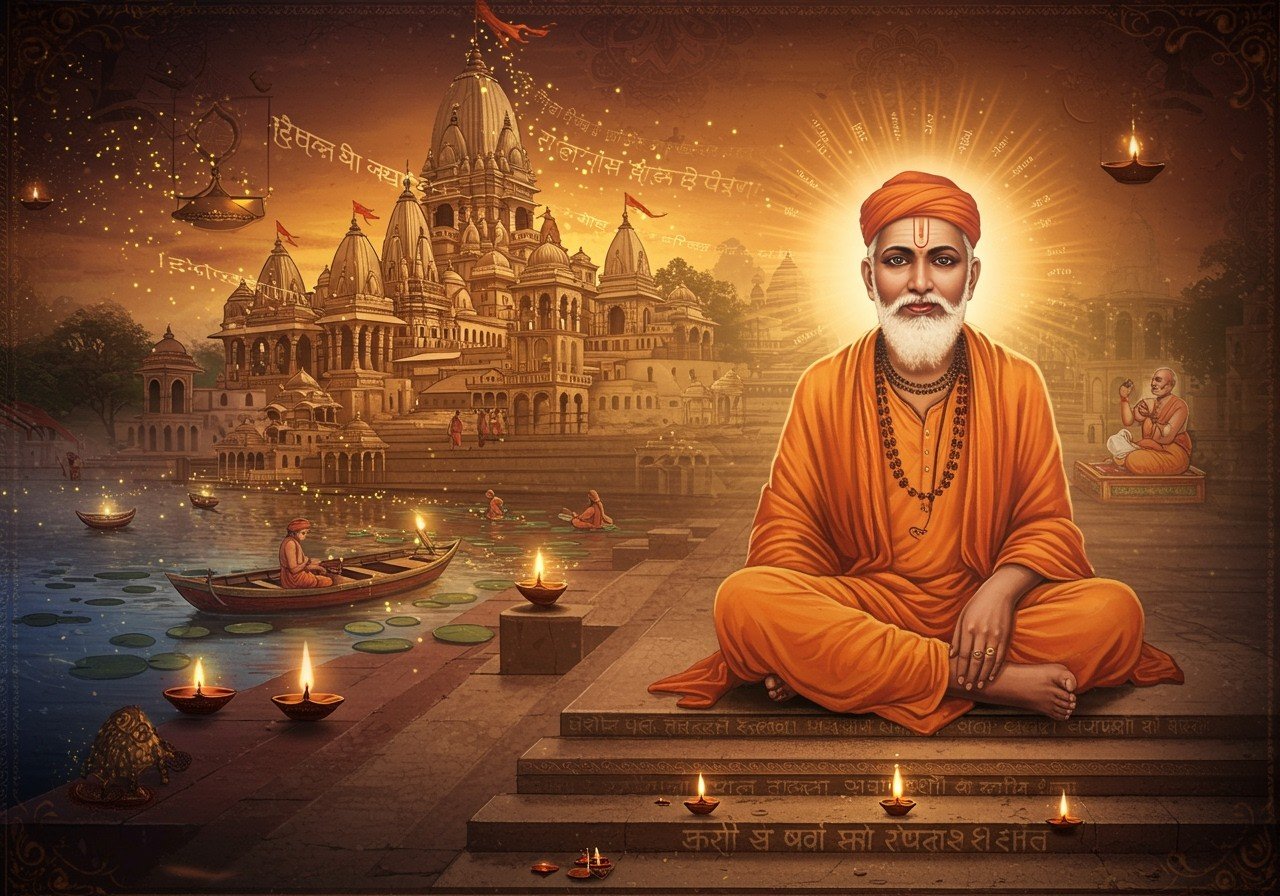
In today’s fast-paced world, finding spiritual grounding is essential. Sant Eknath (1533-1599), a revered saint from Maharashtra, India, offers timeless wisdom that resonates even in 2025. By understanding his spiritual journey, we can explore the cultural and spiritual significance of his life and teachings.
Early Life and Influences of Sant Eknath
Sant Eknath was born in 1533 in Paithan, Maharashtra, into a Deshastha Rigvedi Brahmin family. His early life was profoundly shaped by his family and the spiritual environment of the time. His parents, Suryanarayan and Rukmini Bai, instilled strong values in him, while his great-grandfather, Sant Bhanudas, a prominent figure in the Warkari sect, nurtured his spiritual leanings. The pervasive Bhakti movement, with its focus on devotion to God, significantly influenced his worldview.
His spiritual journey began under the guidance of Janardan Swami in Daulatabad. This mentorship honed Eknath’s spiritual understanding and literary skills, laying the foundation for his prolific contributions. Immersed in rigorous spiritual disciplines, he explored Vedanta, Nyaya, Mimansa, Yoga, and Sanskrit grammar. This deep dive into ancient texts and philosophical traditions enriched his wisdom and shaped his unique perspective.
Core Teachings and Philosophy
Sant Eknath’s teachings emphasized devotion, humility, and compassion. He taught that true devotion transcended mere rituals, residing instead in pure love for God and selfless service to others. He stressed the importance of purity of heart and mind, encouraging a life of moral integrity.
Central to his teachings was Nama-smarana, the continuous chanting of God’s name. Eknath believed that this practice purified the mind, elevated the soul, and brought one closer to the divine. He advocated for social equality, challenging the prevalent caste system by treating all individuals with respect and compassion, regardless of their social standing. He believed that spiritual wisdom should be accessible to everyone, breaking down barriers of caste, religion, or class.
Literary Contributions
Sant Eknath’s literary legacy is vast and impactful. His abhangas (devotional songs), ovis (narrative verses), and bharuds (dramatic compositions) enriched Marathi literature. Known for their clarity and eloquence, his writings conveyed profound spiritual wisdom in simple language, accessible to all. His works helped bridge the gap between the divine and the common people, allowing them to connect with spirituality in their native tongue.
Among his most celebrated works is the Eknathi Bhagavata, a Marathi commentary on the 11th book of the Bhagavata Purana. This commentary simplifies complex spiritual concepts, emphasizing bhakti (devotion) as the core teaching. He also authored biographies of prominent saints like Namdev, Gora Kumbhar, Savta Mali, and Chokhamela, further contributing to the rich tapestry of spiritual literature. His vast collection of ovis, numbering in the hundreds, and over four thousand abhangas, alongside his Bhavarth Ramayan, a unique rendition of the Ramayana, stand as testaments to his literary genius.
Furthermore, Sant Eknath played a crucial role in preserving and popularizing the Jnyaneshwari, a seminal work of Sant Dnyaneshwar. He meticulously collated and edited different versions, establishing what is now considered the authoritative text. This effort underscores his commitment to preserving and disseminating spiritual knowledge.
Legacy and Impact on Modern Spirituality
Sant Eknath’s influence continues to resonate in contemporary spiritual practices. His teachings on universal love, devotion, and equality transcend religious boundaries. The annual Eknath Shashti festival serves as a testament to his enduring legacy, offering devotees a chance to honor his life and teachings. His emphasis on love and equality continues to guide and inspire individuals on their spiritual paths.
In the digital age, his message reaches a global audience through online platforms and initiatives. His teachings provide solace and direction in a world grappling with rapid change and uncertainty. Celebrating Sant Eknath in 2025 and beyond signifies embracing his timeless wisdom and applying it to contemporary challenges.
How Poojn.in Supports Your Spiritual Journey
Poojn.in, India’s largest cultural goods and services store, provides a wide range of products to enhance your spiritual practice. Whether you seek religious texts, puja items, devotional accessories, or enlightening literature, Poojn.in offers a diverse collection to support your connection with Sant Eknath’s teachings.
Explore our selection of authentic spiritual books like the Srimad Bhagavad Gita and enhance your puja with traditional items like clay diyas and pure cotton wicks. Our holy idols and holy utensils are crafted with utmost care to maintain authenticity. We also offer a wide variety of holy cosmetics, holy food,holy jewellery and jaribooti. Visit www.poojn.in to explore our comprehensive collection.
Embracing Sant Eknath’s Timeless Wisdom
Sant Eknath’s life and teachings remain a source of inspiration, offering valuable lessons in devotion, compassion, and equality. As we navigate the complexities of modern life, his wisdom provides guidance and his humility inspires us to embrace a life of service and love. In 2025 and beyond, let us continue to honor his legacy by incorporating his principles into our daily lives.
Through festivals, events, and online resources, his message of unity and love reaches a global audience. His spirit endures, guiding us towards a path of peace, resilience, and spiritual growth.
FAQs on Sant Eknath
Who was Sant Eknath? Sant Eknath (1533-1599) was a revered saint, philosopher, and poet from Maharashtra, India. He is a key figure in the Warkari movement and is known for his profound spiritual teachings and literary contributions. His work continues to be studied and celebrated today.
What were his main teachings? Sant Eknath’s teachings emphasized devotion (bhakti), humility, compassion, and equality. He advocated for nama-smarana (continuous chanting of God’s name) and encouraged a life of moral integrity. His teachings transcended social barriers, promoting spiritual accessibility for all.
What are his notable literary works? Sant Eknath’s literary contributions are extensive, including abhangas, ovis, bharuds, and the Eknathi Bhagavata, a commentary on the Bhagavata Purana. He also wrote biographies of prominent saints and a version of the Ramayana known as Bhavarth Ramayan. Additionally, he played a pivotal role in preserving and standardizing the Jnyaneshwari.
Where can I learn more about Sant Eknath? You can explore his life, teachings, and works through books, online resources, and by visiting his Samadhi in Paithan, a significant pilgrimage site. Numerous websites and libraries offer detailed information about his life and legacy. You can also find information on Tulsi Peeth Teachings, Ashrams in Hinduism, Tulsi Peeth Acharya Ramchandra Das, and Jyotiba Temple for a wider spiritual exploration.


